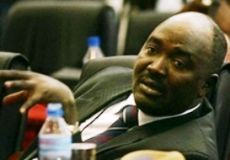Eritrea: A refuge for Darfur rebels
By Jeffrey Gettleman
October 4, 2007 (ASMARA, Eritrea) — An alliance of rebel leaders from Darfur said Thursday that it needed more time to heal internal splits, and that unless something changed quickly, the much anticipated peace talks scheduled for later this month would probably fail.

“Right now we’re headed toward another Abuja,” he said, referring to Abuja, Nigeria, where a peace deal signed by the Sudanese government and one rebel faction in 2006 hardly stopped Darfur’s bloodshed and may have only added to the chaos.
On Thursday, Mr. Khamis and fellow rebels from Darfur, the troubled region of western Sudan, lounged in a mustard-colored villa in Asmara, Eritrea’s capital, making phone calls and watching European soap operas on TV. All of this was courtesy of the Eritrean government, which has been a loyal friend to many of Darfur’s rebel groups and a player in the peace negotiations, even as American officials are accusing Eritrea of sponsoring terrorism in other parts of the region.
Eritrea is a little country with big ambitions. Since its independence in 1993, it has projected an aggressive foreign policy, shaping events in the Horn of Africa, though it has only five million people and is one of the poorest countries on earth.
In the past few months, Eritrea has opened its doors to rebel commanders from its neighbors, especially Ethiopia, Sudan and Somalia, which is part of the reason American officials are alarmed. The State Department says Eritrea has been shipping arms to Islamist fighters in Somalia, an allegation that the Eritrean government denies. At the same time, American diplomats have been quietly working with the Eritreans to push Darfur’s ever expanding galaxy of rebel groups to peace talks scheduled for the end of October in Libya.
The Eritreans have a decent track record, American officials say, when it comes to Sudan. Last year, the president of Eritrea, Isaias Afewerki, brokered a peace deal between the Sudanese government and rebels in a separate conflict in eastern Sudan that had ground on for 15 years and that cost thousands of lives.
African Union officials said Eritrea wields even more influence in Darfur, because of its longstanding contacts with the rebel groups there.
The Eritreans “have control over some of these movements,” said Sam Ibok, a senior adviser of the African Union. “And the Eritreans have played a constructive role.”
Leaders of Darfur rebel groups are spread out among a number of countries, including Chad, Libya and Egypt, as well as within Darfur itself. More than half a dozen Darfur rebel groups have hung out a shingle in Asmara. And in some cases, like the United Front for Liberation and Development, which claims to have more than 10,000 fighters in Darfur, the Eritrean government pays the rent. The rebels say Eritrea is a good base of operations because it is safe; it has an international airport and reliable phone lines; and various rebel leaders can meet anytime, day or night, in one of the city’s countless sidewalk cafes and talk shop over a cup of espresso — something they definitely could not do in Darfur itself.
“This has been an important front for Darfur for years,” Mr. Khamis said, strolling down a sunny street in Asmara. “We like it here.”
The situation on the ground in Darfur seems to be degenerating by the day, as evidenced by the massacre of 10 African Union peacekeepers over the weekend. The rebel leaders in Asmara denied that their fighters were responsible, even though African Union officials have blamed groups allied to some of them for the attack. Several rebel leaders said they feared the bloodshed would only get worse if the talks in Libya failed.
“We could get the people’s hopes up, and there could be a lot of frustration when nothing is accomplished,” said Abdulaziz Dafallah, a leader of the Revolution Democratic Forces Front, a Darfur rebel group that is part of Mr. Khamis’s alliance.
He said the rebels were behind in two key areas that were supposed to be wrapped up by now: appointing a negotiating team to represent all major groups and training the negotiators.
Mr. Ibok agreed that this was a problem and said “the people we require urgently for these talks don’t seem to be ready for them.”
(New York Times)
